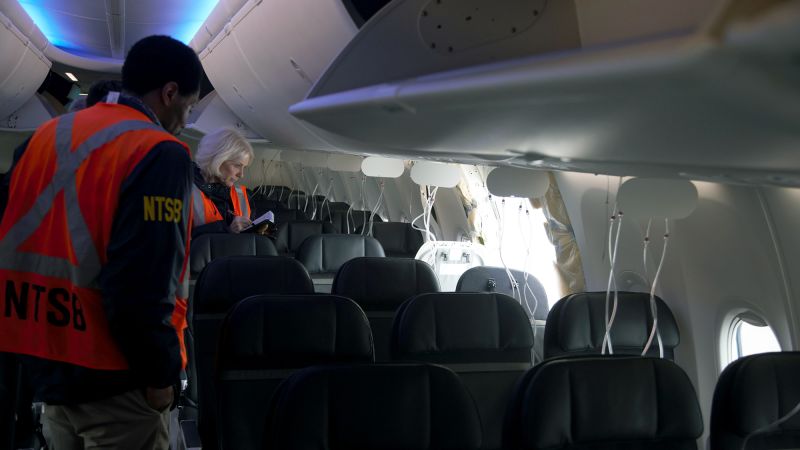
Key bolts were missing from a Boeing door plug that blew out in mid-air, report says
CNN
Investigators from the National Transportation Safety Board on Tuesday said evidence shows four bolts that hold the door plug in place on the Boeing 737 Max 9 were missing at the time of last month’s blowout on Alaska Airlines flight 1282.
Investigators from the National Transportation Safety Board on Tuesday said evidence shows four bolts that hold the door plug in place on the Boeing 737 Max 9 were missing at the time of last month’s blowout on Alaska Airlines flight 1282. The new finding from federal investigators comes one month and a day after the January 5 incident that triggered a 19-day emergency grounding of all Max 9s, and re-ignited scrutiny of Boeing following the fatal Max 8 crashes of 2018 and 2019. Boeing acknowledged its responsibility for the blowout in a statement issued after the NTSB report and said it is working to make sure incidents like this do not reoccur. “Whatever final conclusions are reached, Boeing is accountable for what happened,” said Boeing CEO Dave Calhoun in a statement. “An event like this must not happen on an airplane that leaves our factory. We simply must do better for our customers and their passengers.” Boeing said it was taking new actions to improve the way it makes the 737 Max 9 planes. That includes more inspections, giving the 737 teams more time “to focus on and implement quality improvements,” and bringing in outside safety experts to assess its operations. In their 19-page preliminary report released Tuesday, NTSB investigators included observations from a laboratory disassembly of Alaska 1282’s door plug, which fell 16,000 feet into an Oregon backyard. It said the lack of damage to the plug where the bolts were supposed to attach it to the fuselage of the plane pointed to the conclusion that the bolts were missing at the time of the flight.

NY attorney general sues Zelle parent company, alleging the payment service enabled widespread fraud
New York Attorney General Letitia James on Wednesday sued Early Warning Services (EWS), which operates Zelle, alleging the electronic money-transfer service fails to protect its users from “massive amounts of fraud.”

If Meta investors had concerns about the company’s huge spending on artificial intelligence infrastructure and talent, they’re likely to be assuaged by its blockbuster earnings report on Wednesday. The results, as one analyst put it, indicates that “AI is becoming a real revenue driver, not just hype.”





















 Run 3 Space | Play Space Running Game
Run 3 Space | Play Space Running Game Traffic Jam 3D | Online Racing Game
Traffic Jam 3D | Online Racing Game Duck Hunt | Play Old Classic Game
Duck Hunt | Play Old Classic Game









